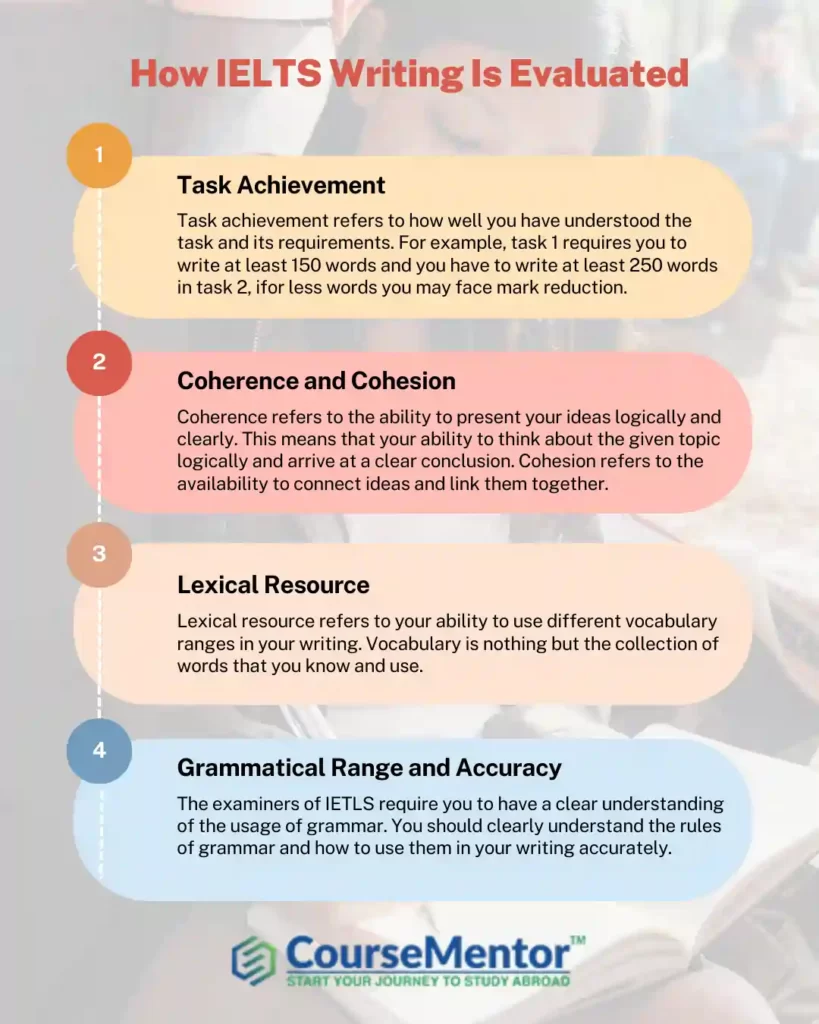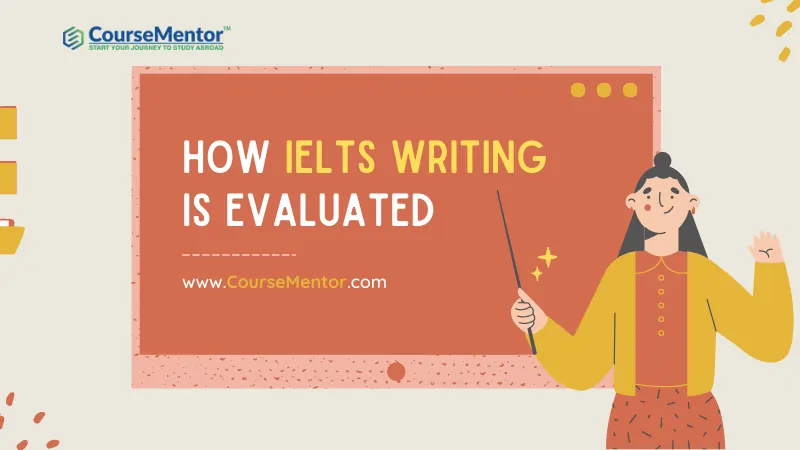The International English Language Testing System (IELTS) is a widely recognized language proficiency test for measuring language skills. This exam is taken by students who want to migrate abroad to work or study.
It consists of four modules: Listening, Reading, Writing, and Speaking. To prove your language proficiency, scoring well in all four modules is important.
In this blog, we will focus on IELTS writing and discuss how IELTS Writing is evaluated and provide some essential tips that students must use to improve their writing score.
Knowing the IELTS writing evaluation criteria will help students to understand IELTS writing more properly and score high in IELTS writing.
Format of IELTS Writing
Before we go through the evaluation system, let us first discuss the format of IELTS Writing. This will give you clarity on how IELTS writing is evaluated. The IELTS Writing section is divided into Task 1 and Task 2.
Task 1 consists of a diagram, a pie chart, a bar graph any other form of visual representation of data. You are required to understand the data represented in the graphical or diagrammatical form and then describe what you understand in your words.
Task 1 is easier than the second one, requiring you to write what you see and understand. The whole writing section is of 60 minutes. So, it is advised that you spend a maximum of 20 minutes on the task 1.
Task 2 is different from Task 1. This task requires you to write an essay on the topic given to you. There are different types of essays in IELTS writing task 2. The topics are rather general, but you must write at least 250 words. If you write less, then you will lose marks.
The key to scoring high in task 2 is practicing and understanding how IELTS Writing is evaluated. You need to read a lot of model writing answers from the internet and practice organizing your thoughts, and write a good essay that has all your opinions in an organized manner.
How IELTS Writing Is Evaluated
The IETLS is very much clear about the evaluation of all the sections. All the sections are evaluated on several different criteria.
The writing section is also evaluated based on 4 different criteria. These four criteria are marked separately, and then the average band of all these 4 criteria makes up your final IELTS writing band.
Let’s understand how IELTS writing is evaluated by looking into these criteria. The four criteria are:

- Task achievement
- Coherence and cohesion
- Lexical Resource
- Grammatical range and accuracy
All these criteria carry equal weightage in the final score. Now to get more clarity on how IELTS writing is evaluated, let us understand each of these criteria in detail:
Task Achievement
The first and by far the most important criterion is task achievement. It is important to understand what task achievement is to clarify how IELTS writing is evaluated.
Task achievement refers to how well you have understood the task and its requirements. For example, task 1 requires you to write at least 150 words describing the visual representation.
In the same way, you have to write at least 250 words in task 2, if you write any less than the required word count, you will face a reduction of marks.
You can avoid this by keeping an eye on the word counter that appears on the screen when you give the actual exam. Apart front the word count, there may be specific requirements for both tasks.
You first need to read carefully what the task is using. Task 1 may ask you to understand the data and then predict how the data will look in the future.
You can improve your task achievement by giving several practice tests. Look for the requirements when you attempt the test, and as you give more and more tests, try to identify how the marking is affected when you write differently.
In task 2, most students do not think task achievement is important. But in task 2, they will give you a topic and may or may not ask you to share your opinions on some specific point.
You should clearly understand how IELTS writing is evaluated with respect to both tasks. You should ensure you read the requirements carefully and write up to them.
It is always good to write a bit more than the minimum word limit but do not write too much.
Read our other blog if you struggle with writing task 1 in the IELTS exam and want to improve IELTS writing task 1.
Coherence and Cohesion
Let us look deeply into coherence and cohesion to clarify how IELTS writing is evaluated. Most students have confused with the words coherence and cohesion.
Coherence refers to the ability to present your ideas logically and clearly. This means that your ability to think about the given topic logically and arrive at a clear conclusion will be marked as coherent.
Cohesion refers to the availability to connect ideas and link them together. To achieve the highest score in coherence, you would first calmly think about the topic you are given and organize your thoughts on it.
Most students start writing straight up, leading to an unorganized essay. Try to put your opinions in the clearest way possible. Do not let them mix.
You can improve your cohesion by making your essay look linked perfectly. Your essay should flow smoothly and should have paragraphs in the appropriate spaces. Do not make your ideas and opinions unorganized; link them together.
Whenever linkage is impossible, you have to switch to a different opinion or aspect using a paragraph.
If you have difficulty in the introduction of IELTS writing task 2 and want to learn how to start IELTS writing task 2, then our other blog will be very helpful to you.
Lexical Resource
The lexical resources are the third criterion to understand how IELTS writing is evaluated. Many students tend to lose marks in this criteria.
Lexical resource refers to your ability to use different vocabulary ranges in your writing. Vocabulary is nothing but the collection of words that you know and use.
Students tend to think that their vocabulary is good enough, but they need new and catching words to get the examiner’s attention.
It is okay not to use very hard words, but the examiners will evaluate your skill in using different words.
Use as many good words as possible to make your essay look good. Vocabulary can also help you in all the other sections of the IELTS.
You can improve your vocabulary with some of the bestselling vocabulary books. These vocabulary books consist of thousands of different and new words with their meaning and usage that you can use.
You can learn some 10 – 20 different words every day and then try to use them daily. Another mistake that most students do is just to mug up the words and not care about the usage of those words.
You should know how and where the words are used. Students tend to use words wrongly, which changes the sentence’s meaning and reduces the score.
Read our other blog to learn How To Improve Vocabulary For IELTS.
Grammatical Range and Accuracy
This is the criterion that many students undermine and think that they already know how to use grammar. However, it is important to understand how IELTS writing is evaluated concerning grammatical range and accuracy.
The examiners of IETLS require you to have a clear understanding of the usage of grammar. You should clearly understand the rules of grammar and how to use them in your writing.
You can use a book specially designed for grammar in IELTS. These books are written by experts who clearly understand what IELTS examiners are looking for and how you can get full marks in grammar.
You should also take good care of your usage of tenses. Most students do not use tenses clearly, leading to a score reduction.
Another aspect that is evaluated in the IETLS writing is accuracy. Accuracy refers to your correct spelling of words and correct usage of punctuation in the essay.
You can take care of the spelling by reading your essay once you finish it. You just have to review the essay and look for any spelling mistakes you might have made quickly.
Punctuations are another very important thing that affects your score. You can look for the correct purpose and usage of different punctuation online and take notes of it.
You should know where to use a question mark, exclamation mark, full stop, comma, semi-colon, and other punctuation. Do not use them forcefully, use them only when needed.
If you want to know the recent Academic IELTS Writing Task 2 Topics, read our other blog.
Effective Tips for IELTS Writing
While understanding how IELTS writing is evaluated is essential, developing effective strategies to score high in the IELTS Writing test is equally important. Here are some of the best tips to help you improve your writing skills and increase your chances of getting a good score.
Practice Regularly
Consistent practice is key to improving your writing skills. Give proper time every day to work on your writing skills. Practice writing essays, analyzing graphs, and summarizing visual information. Ask your teacher or any friend with good English knowledge for feedback about your writing to identify areas for improvement.
Analyze Sample Essays
In practice books or official websites, you can find the IELTS writing 7+ bands essays, read and analyze them to learn new things. Pay attention to the structure, vocabulary, and organization of ideas in those sample answers.
Expand Your Vocabulary
Developing a wide range of vocabulary is important for getting a higher score in IELTS Writing. Read a lot to learn new words and write them down in a book to keep track of them. While practicing, try to use them in your writing to strengthen your vocabulary.
Time Management
Time management is an important skill everyone must have to score high on the IELTS Writing test. Manage your time in a way that you will have sufficient time to plan, write, and review your essay. Always save 5 minutes, in the end, to proofread your work to find mistakes.
Conclusion
IELTS Writing evaluates students’ ability to respond to general topics by maintaining coherence and cohesion, showing strong lexical resources, using accurate grammar, and achieving the task requirements.
Getting a high band score in the IELTS writing requires language skills and wants you to understand writing evaluation criteria and use effective techniques.
Understanding how IELTS writing is evaluated and implementing the tips like regular practice, expanding vocabulary knowledge, reading sample answers, etc, can help you improve your IELTS writing score.
I hope this blog has cleared all your queries about how IELTS writing is evaluated. If you still have concerns, contact our experts or let us know through comments.
If you like this blog and want to read more interesting and informative blogs like this, keep visiting CourseMentor™.
FAQs
Is it hard to get 6.5 in ielts writing?
Yes, if you do not have knowledge or advanced vocabulary or lexical resources and do not use complex sentences in your writing, it may be hard for you ti get a 6.5 band score in the IELTS exam.
Why is my ielts writing score so low?
The main reason that your IELTS writing score is low can be that you lack “task achievement” or “lexical resources.” Because these are the two most important writing criteria for checking the exam.
Can I use bullet points or numbered lists in my IELTS Writing?
No, you must avoid using bullet points or numbered lists in IELTS Writing. You must use complete sentences so the reader can easily and clearly understand what you want to say.
How much time should I spend on Tasks 1 and 2 in IELTS Writing?
Task 1 is shorter and easier than Task 2, so spending less time on Task 1 is recommended. You must complete your Task 1 in less than 20 minutes so that you have at least 40 minutes to understand and write the IELTS writing task 2.





